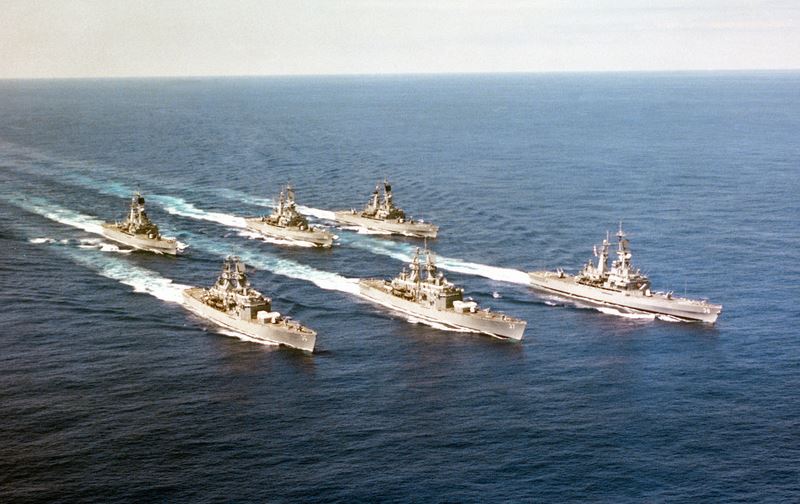The sea is vast. And so are its laws. When it comes to measuring the vastness of the conventions that make up the soft law of the sea, we are most often left with a series of doubts. What if and what not act as a stigma towards the binding nature of law. Then there lies the ever-growing cloud of suspense with regards to ratification. What could have been an easy deal gets murkier with countries breaching an already ratified convention. This leads to an inter-country vis-a-vis inter-continent dilemma and a road that is just a repeat version of “back to square one”. History says a lot more when it comes to maritime disputes. True, there are conventions, declarations, and protocols. But who is the supervisor? Is the great United Nations really a guardian in need or is it just a silent spectator to the never-ending maritime disputes? It may be well answered by our conscience.
In the very recent days, a significant incident shook the international world. Rather the Indo-U.S. foreign relation, to be more specific. Whether to scale such an incident as a threat or a mere mistake is still a question to prominent scholars and analysts. A U.S warship entered 130 nautical miles of Lakshadweep. The first question that may crop up in a reader’s mind is whether the passage of the U.S. warship illegal. If so why and how.
Well, the entire incident has invoked two distinct issues: UNCLOS and FONOPS (Freedom of navigation). The concept of EEZ (Exclusive economic zone) has been vividly defined in the UNCLOS along with two other subsidiary concepts: continental shelf and contiguous zone. The concept of EEZ has been defined under Article 55 of the UNCLOS. So EEZ or exclusive economic zone is an exclusive right given to the coastal nation-states and extends up to an area of 200 Nautical Miles from the baseline of the concerned nation. Here the term exclusive suggests that the nation-state has an exceptional right to explore the area of 200 Nautical Miles.
The rights include:
- Right of exploration and exploitation of natural resources.
- Generation of energy
- Construction of artificial islands and installation of structures legally validated by the convention
- Preservation and sound management of available resources.
- Conducting research activities
Therefore the entire concept of EEZ and the exclusivity in rights of the coastal and sometimes the land-locked states reveal to a certain extent that the freedom of navigation for other nation-states have been curbed by the UNCLOS. But in reality, it is not the case.
This is because of the concept of FONOPS or freedom of navigation operation. FONOPS was previously a part of customary international law and not binding in nature. But after UNCLOS came into existence the provision of FONOPS has been inculcated under Article 87(1) of the UNCLOS. This infuses the lost rights of the other nation-states over exploration and exploitation of resources in the high seas. But the rights mentioned under FONOPS must not in any way breach the rights guaranteed by EEZ. Further, the former rights are subject to the conditions mentioned under UNCLOS.
The right of FONOPS under the said article does not include the military rights of warships and vessels and this creates great confusion in the International Law regime. So why did the US warship’s exercising the right of FONOPS in the Indian Ocean create an uproar? When the US warship touched the 130 nautical miles, the US reasoned FONOPS and innocent passage being the factors behind the operation. The irony lies in the fact that neither FONOPS nor innocent passage under Article 52 of UNCLOS mentions or has provisions for military vessels.
Both the provisions of FONOPS and EEZ are mentioned under UNCLOS. So far the United States of America has not ratified the Convention. When a nation-state does not ratify a soft law it indicates that it will not be required to abide by the Convention. It also indicates that the concerned nation-state will not be subject to the advantages (if any) guaranteed by the convention.
When USS John Paul Jones conducted a FONOPS in the Indian Ocean 130 nautical miles west of Lakshadweep Islands not only did it fail the importance of UNCLOS but also created a dent in the Indo-US relationship which was expected to have strengthened after India became a party to the Quad. The USA is known for conducting numerous FONOPS and the most important being in the South China Sea where the main reason behind the operation is “challenging China’s expansive nine-dash line maritime claims”.
In the past well US FONOPS near Lakshadweep was found in 2015, 2016, and 2017 as per the Pentagon reports. The scholars, diplomats, and the media have forwarded various reasons behind this operation. In the future USA is expected to abide by the soft laws read with the domestic laws of a nation-state in order to preserve the sanctity of diplomatic relations and balance of power.

Related Posts
Explore the 5G technology: Advantages and Disadvantages
Virtual Court during the pandemic: A Boon or Bane
How U.S.A free to navigation (FONOPS) in India’s EEZ: A Tool OR Tale
Legislations and Remedies Protecting E-Commerce in India
Legal Requirements for operating drones in India
Advancement of Space Laws- A new Horizon in Techno-legal field